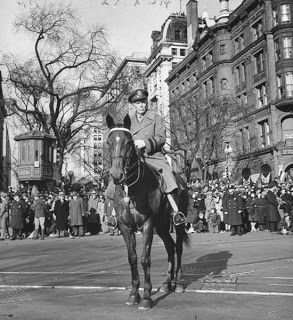
Think of one of your defining experiences. It stays with you year after year, a visible thumbprint on who you are as a leader. Chances are good that whenever you face Major Change your mind turns to that defining experience. It molds your response.
Let me introduce you to the man on the horse in the photo. George Marshall. He’s riding at the front of President Franklin Roosevelt’s inaugural parade in early 1941. Marshall has something to share with you.
Like you, he has a defining experience. It’s his experience in the “World War”, 1917-1918. In fact, he’s got a slight facial tic from the ordeal. That’s a symbolic example of the thumbprint.
Marshall became the US Army Chief of Staff in 1939. When he took this position the American military was, according to one national magazine, 17th in the world in size, strength, and funding. This was also, ominously, the same time that Adolf Hitler and Nazi Germany launched what people soon referred to as the “Second World War.”
Part of Marshall’s leadership as Chief of Staff was to realize that, left to themselves, the officer corps of the US military would default to the thumbprint, its experience in the World War of 1917-1918. Such a thing might be acceptable if nothing had changed since then. However, nearly everything had changed. Most importantly, the ideas of the enemy had changed.
Hitler’s Germany practiced a new style of warfare, lightning war, or blitzkrieg. Marshall was one of the few American military leaders who had followed this trend. Most officers did not, and that’s where Marshall knew they would stay–stuck in the mindset of re-fighting 1918, their primary, defining remembered experience.
Marshall determined that he needed to act. He tracked two lines of action. First, he organized a special committee of bright, innovative officers to identify existing commanders who were clearly opposed to new techniques and to change. The “Plucking Committee”, as it was called, recommended the removal of this group. Second, Marshall oversaw the design and execution of an entirely new learning exercise, the Louisiana and Carolina Maneuvers. The L/C Maneuvers brought together unprecedented numbers of soldiers to train in a “fake war” across hundreds and hundreds of miles. Marshall saw to it that they faced new situations and, thus, had the chance to display whether or not they would utilize new approaches and methods. Between these two actions, Marshall gutted the existing officer class and made room for fresh-thinking and fast-thinking leaders on all levels.
The next time you sense a Major Change is coming, that a version of your leadership’s 1941 is on its way, invoke the wisdom of George Marshall. A defining experience is an excellent foundation upon which to build. It should never be a prison from which there is no escape. Watch out for 1918.
Contact me if you’d like this story customized into a Talkshop for your team.







